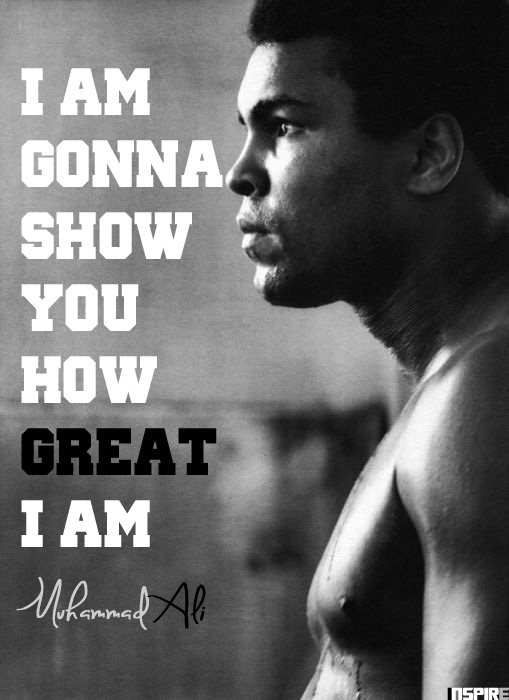
Photo Credit: pinterest.com
“The more we help others, the more we help ourselves”: Mohammed Ali (Cassius Clay), 1942-2016
The boxing legend Muhammed Ali breathed his last yesterday at the age of 74.
Announcing the death of “The Greatest of All Time”, his official website noted, “Boxing was just one of the amazing facets of Muhammad Ali – the man. His story, told in and outside of the ring, is unparalleled in modern celebrity”.
Ali died at a hospital in the US city of Phoenix in Arizona where he had spent the last few days being treated for respiratory complications.
Here are some glimpses into the life of the self-proclaimed ‘King of the World’ — life time record of 56 wins including 37 knock-outs and 5 losses before he hung up his gloves — as narrated on his website:
Cassius Clay Sr. gifted his son a new red-and-white Schwinn in 1954, which was promptly stolen. The 12-year-old, 89-pound Cassius Clay vowed, “I'm gonna whup whoever stole my bike!” A policeman, Joe Martin, told young Cassius Clay that he better learn how to fight before he challenged anyone. After 6 months of training with Joe Martin, Cassius won his debut match in a three-round decision. Young Cassius Clay dedicated himself to boxing and training with an unmatched fervor. According to Joe Martin, Clay set himself apart by two things: He was “sassy,” and he outworked all the other boys.
Rome Olympics: Fear of flying
Shortly after his high school graduation, 18 year-old Cassius Clay began his journey towards greatness at the 1960 Rome Olympics. His expansive personality and larger-than-life spirit earned him the nickname ‘The Mayor of Olympic Village.’
The future 3-time Heavyweight World Champion nearly missed the trip to Rome due to his fear of airplane travel; he insisted on bringing a parachute on the plane with him.
On September 5, 1960, ‘The Greatest’ proved his dominance in the Light Heavyweight Boxing Division by beating Zigzy Pietrzykowski of Poland, capturing the Olympic Gold Medal. Sports Illustrated praised Clay's “supreme confidence” and “intricate dance steps.”
‘My name is Muhammed Ali’
While training for his title bout against the fearsome heavyweight champion, Sonny Liston, Cassius Clay met Malcolm X. Malcolm became young Clay's mentor and brought him into the Nation of Islam. Despite the 7-1 odds, Clay defeated Sonny Liston in Miami and became Heavyweight Champion of the world in 1964. Shortly after, he announced to the world that he was a member of the NOI and that his name was now Muhammad Ali. Weeks later, Malcolm X left the NOI and their friendship ended. Howard Cosell was one of the few journalists who acknowledged Ali's name change at the time.
[As his profile rose, Ali spoke out against American racism. On being refused services at a soda fountain counter, he said, he threw his Olympic gold medal into a river. Ali was 22-years-old when he decided to give up his “slave name” to be renamed Muhammed Ali by the Nation of Islam founder Elijah Muhammed].
Refusal to fight in the Vietnam War
When Muhammad Ali refused to enter the Vietnam War draft he was stripped of his championship titles, passport, and boxing licenses. He lost an initial court battle and was facing a 5-year prison term. Muhammad Ali was the first national figure to speak out against the war in Vietnam. During his 3 ½ year layoff, Ali earned a living speaking at colleges. In 1970, with the mood of the country changing, Ali staged his comeback; first against Jerry Quarry in Atlanta, and then Oscar Bonavena at Madison Square Garden. In his next match, billed as “The Fight of the Century”, Ali faced undefeated Champion, Joe Frazier at Madison Square Garden on March 8, 1971.
Ali fought valiantly, but lost. Months later, however, he won one of the biggest fights of his life – the Supreme Court reversed his conviction and upheld his conscientious objector claim. Ali was free of the specter of prison, and once again able to box anywhere in the world.
Battle with Parkinson’s
In 1984, Muhammad Ali publicly announced that he had Parkinson’s disease, a degenerative neurological condition. Following his diagnosis, he created and continues to raise funds for the Muhammad Ali Parkinson’s Center in Phoenix, Arizona. Although his disease has progressed, Ali remains an active public figure and philanthropist, dedicated to his faith and humanitarian beliefs.
Tributes:
"At a time when blacks who spoke up about injustice were labelled uppity and often arrested under one pretext or another, Muhammad willingly sacrificed the best years of his career to stand tall and fight for what he believed was right. In doing so, he made all Americans, black and white, stand taller. I may be 7ft 2in but I never felt taller than when standing in his shadow."
– former basketball player Kareem Abdul-Jabbar
"It's a sad day for life, man. I loved Muhammad Ali, he was my friend. Ali will never die. Like Martin Luther King his spirit will live on, he stood for the world.''
– Don King, who promoted many of Ali's fights, including the Rumble in the Jungle.
"There will never be another Muhammad Ali. The black community all around the world, black people all around the world, needed him. He was the voice for us. He's the voice for me to be where I'm at today." – Floyd Mayweather, world champion boxer across five divisions.
"You were a champion in so many ways. You 'fought' well. Rest well."
– Bernice King, daughter of civil rights leader Martin Luther King.